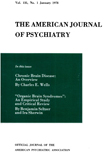Addicted Viet Nam Veterans: A Comparison of Self-Referred and System-Referred Samples
Abstract
The authors report that addicts who volunteered for an Army heroin treatment program differed from those who were detected by urine screening in that they had displayed a greater degree of antisocial behavior in civilian life and had more frequent psychiatric contacts in the service as well as a more extensive history of drug use. The finding that drug use is less frequent during the earliest months of military training than during both the preceding civilian months and the later phases of military duty suggests that recognition and intervention during the early months of military training may be the chief means of primary prevention.
Access content
To read the fulltext, please use one of the options below to sign in or purchase access.- Personal login
- Institutional Login
- Sign in via OpenAthens
- Register for access
-
Please login/register if you wish to pair your device and check access availability.
Not a subscriber?
PsychiatryOnline subscription options offer access to the DSM-5 library, books, journals, CME, and patient resources. This all-in-one virtual library provides psychiatrists and mental health professionals with key resources for diagnosis, treatment, research, and professional development.
Need more help? PsychiatryOnline Customer Service may be reached by emailing [email protected] or by calling 800-368-5777 (in the U.S.) or 703-907-7322 (outside the U.S.).



